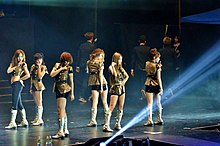Chinese idol
 From Wikipedia the free encyclopedia
From Wikipedia the free encyclopedia

The Chinese music industry has a growing trends of idols and idol groups, entertainer manufactured and marketed for image, attractiveness. Idols are primarily singers (either as a member of a group or as a solo act), but they are also trained in other roles, such as acting, dancing, and modeling. Unlike other celebrities, idols are promoted through merchandise and endorsements by talent agencies while maintaining a carefully curated public image and social media presence, as well a strong emotional connection with a passionate fan base through concerts and meetups.
History[edit]
The 2010s saw the rise in popularity of Japanese-style idol groups such as SNH48 and boy idols like TFBoys and K-pop style idol groups such as Nine Percent, R1SE, INTO1, and many more. Korean idol groups such as Exo-M, SJ-M and T-ara also reached a larger audience through performances in China.[citation needed]
In the following years, a large number of idol groups debuted, beginning what media nicknamed the Age of the Idol.[1][2][3] On January 27, some members of SNH48 performed on the CCTV New Year's Gala 2017 as backup dancers during a segment with Coco Lee and JJ Lin. This was the first appearance by an idol group at a major Chinese event.

Idol survival shows[edit]
Following the success of the Super Girl TV series in China, there had been an open market in China for Survival shows. In 2018, there were a number of idol survival shows, like Idol Producer and Produce 101 China,[4] through which Nine Percent and Rocket Girls 101 debuted.[5] Youth With You season 1 and Produce Camp 2019 appeared in 2019.[6]
There are two main brands that have sizable presence in the Chinese entertainment. They are Idol Producer by IQIYI and Produce 101 China by Tencent.
On September 2, 2021 China's National Radio and Television Administration banned reality talent programmes.[7][8][9][10] all relating to controversies after the massively popular idol talent show "Youth With You 3" was taken off air in May 2021[11][12][13][14]
References[edit]
- ^ "The Rise of Idol Economies in China". 18 November 2019.
- ^ "China's Pop Idols are Too Soft for the Party". 12 November 2018.
- ^ "China's Teen-Idol Obsession". www.caixinglobal.com.
- ^ "偶练九人团出道!蔡徐坤范丞丞无悬念 林彦俊爆冷". 6 April 2018.
- ^ "青春有你第1季-综艺-高清正版视频在线观看-爱奇艺".
- ^ 簡, 子喬 (8 June 2019). "冠軍足足贏了第二名2300萬票! 《創造營2019》最終11人名單出爐". Yahoo奇摩名人娛樂. Yahoo. Retrieved 12 February 2020.
- ^ "China bans talent shows in showbiz crackdown – DW – 09/02/2021". dw.com. Deutsche Welle (DW).
- ^ "China bans reality talent shows". The Hindu. THG PUBLISHING PVT LTD. 2 September 2021.
- ^ Ni, Vincent; correspondent, Vincent Ni China affairs (2 September 2021). "China bans reality talent shows to curb behaviours of 'idol' fandoms". The Guardian. Guardian News & Media Limited.
- ^ "China Bans Reality Talent Shows In Major Showbiz Crackdown". NDTV.com. NDTV CONVERGENCE LIMITED.
- ^ Yau, Elaine (5 May 2021). "Chinese boy band show goes off air after allegations against competitor". South China Morning Post. South China Morning Post Publishers Ltd.
- ^ Looi, Sylvia (10 May 2021). "After controversies, no winners for China's 'Youth With You 3' as producers cancel finals". Yahoo News. Yahoo.
- ^ Valley, Alicia (6 May 2021). "After Multiple Controversies, Chinese Government Suspends Production On "Youth With You" Days Before Finale". Koreaboo. Koreaboo.
- ^ ""Youth With You 3" Off The Air, Tony Yu Jingtian Withdrew". CPOP HOME. 4 May 2021.